Before we begin any exposition of how to create a better society, it is necessary to properly define what we are actually talking about. Terms like proletariat and means of production are often tossed around like hand grenades by paper revolutionaries who do not grasp that their audience might not know what we are talking about. In this sense, we should help clear this up by creating a working glossary. Definitions used herein, unless otherwise noted, are taken from the Marxist Internet Archive and given some additions by the author.
- Labor
The basic building block of any Leftist discourse is the recognition that man’s labor is the basis of his existence. Unless one works, one dies. Whether you sweep a floor or trade commodities in the New York Stock Exchange, you must be laboring to make it in this world.
(From a Marxist glossary by Darryl Mitchell) Labor is a purposeful activity that transforms and adapts natural objects so as to satisfy human requirements. Labor is a spontaneous and natural necessity, an indispensable condition of human existence. Without labor human life itself could not develop qualitatively. - Commodity
A commodity is something that is produced for the purpose of exchanging for something else, and as such, is the material form given to a fundamental social relation — the exchange of labor.
(From Mitchell) A commodity is a product of labor created to be sold (exchanged) rather than consumed by the producer. A commodity is, in the first place, a product of human labor that satisfies a human want; in the second place, it can be exchanged for another commodity, based on the socially necessary labor in it. All commodities are products of labor, but not all products of labor are necessarily commodities. A product becomes a commodity and acquires a commodity form, when produced for exchange, rather than consumed by the producer. - Value
A commodity is, in the first place, a thing that satisfies a human want; in the second place, it is a thing that can be exchanged for another thing. The utility of a thing makes is a use-value. Exchange-value (or, simply, value), is first of all the ratio, the proportion, in which a certain number of use-values of one kind can be exchanged for a certain number of use-values of another kind. - Labor Theory of Value
The proposition that the value of a commodity is equal the quantity of socially necessary labor-time required for its production. This theory was best defined by Adam Smith and David Ricardo. However, Marx expanded upon it in one radically unique way.
(From an interview with economist Richard Wolff) When you sit there with the employer and he/she says, “Ok, I’m going to pay you 20 bucks an hour”, you know what Marx is here theorizing, even if it’s not conscious. You know that the only reason the employer is going to give you $20 for every hour you work is if that hour produces more than $20 worth of stuff for him/her to sell. Because if it didn’t, there’d be nothing in it for the capitalist. There’s got to be more than the capitalist gets from you, the worker, than he/she gives you because there’s no other rationale in Marx’s view to account for why this is done. The inference Marx then draws is stark.
Workers are exploited! Why? Because they produce more by their labor than they get. In production workers add more value to the tools, equipment, and raw materials they use up than they are paid for doing so. Therefore, a worker who says to himself/herself, “I will never work for an employer who doesn’t pay me what I’m worth”, is a person who doesn’t understand capitalism. You will NEVER get paid what your worth, because that is the foundation of this system. The capitalist, because he/she has the money to put you to work in the first place only does it if he/she gets more from you than he/she lays out for the process. Which is why if you follow Marx, you have the mass of workers paid more or less what they need to get by, while the growth built into this system accrues to the employer. Or to say the same thing in simple English, the rich get richer and everybody else doesn’t.
This understanding of the exchange of labor for money, that the laborer is inherently being under-paid for their work, is the basis of the argument for a new social order that ends this theft, called exploitation. - Money
Money is the commodity whose sole use is for storing value and acting as a means of payment. That is to say, money is a commodity, but one which has been singled out to play a special role in relation to all other commodities, as the measure of their values. - Capital
Capital is in the first place an accumulation of money and cannot make its appearance in history until the circulation of commodities has given rise to the money relation.
Secondly, the distinction between money which is capital, and money which is money only, arises from the difference in their form of circulation. Money which is acquired in order to buy something is just money, facilitating the exchange of commodities. [Marx represent this as C – M – C or Commodity – Money – Commodity.] On the other hand, capital is money which is used to buy something only in order to sell it again. [Marx represented this as M – C – M.] This means that capital exists only within the process of buying and selling, as money advanced only in order to get it back again.
Thirdly, money is only capital if it buys a good whose consumption brings about an increase in the value of the commodity, realized in selling it for a Profit [or M – C – M’]. - Capitalist
An owner of the means of production. One does not choose to be a Capitalist as one chooses to be a fan of a certain baseball team; to be a capitalist is to be ontologically and and demonstrably different in the way one lives from a worker. A capitalist does not work because they are so rich they do not need to, they own major industries and control the world. They also are quite aware of the contradictions of the system and that workers understand their exploitation. As such, the capitalist class uses the media to engage in a deceptive propaganda campaign to convince workers that they will one day be able to make enough money to become capitalists themselves if they work hard enough. This is simply a lie and the capitalist knows this very well, but it does help keep the workers in line. - Capitalism
The social order we currently live under wherein the capitalist class exploits the majority of humanity for their own selfish ends. Social relations are based on commodities for exchange, in particular private ownership of the means of production and on the exploitation of wage labor.
Wage labor is the labor process in capitalist society: the owners of the means of production (the bourgeoisie) buy the labor power of those who do not own the means of production (the proletariat), and use it to increase the value of their property (capital). In pre-capitalist societies, the labor of the producers was rendered to the ruling class by traditional obligations or sheer force, rather than as a “free” act of purchase and sale as in capitalist society.
Value is increased through the appropriation of surplus value from wage labor. In societies which produce beyond the necessary level of subsistence, there is a social surplus, i.e. people produce more than they need for immediate reproduction. In capitalism, surplus value is appropriated by the capitalist class by extending the working day beyond necessary labor time. That extra labor is used by the capitalist for profit; used in whatever ways they choose.
The main classes under capitalism are the proletariat (the sellers of labor power) and the bourgeoisie (the buyers of labor power). The value of every product is divided between wages and profit, and there is an irreconcilable class struggle over the division of this product.
Capitalism is one of a series of socio-economics systems, each of which are characterized by quite different class relations: tribal society, also referred to as “primitive communism” and feudalism. It is the breakdown of all traditional relationships, and the subordination of relations to the “cash nexus” which characterizes capitalism. - Means of Production
The tools (instruments) and the raw material (subject) you use to create something are the means of production.
(From Mitchell) The nonhuman resources required for production, including land, raw materials, tools, machinery, energy sources, and technology in production.
In our current-day society, this includes things like railways, roads, waterways, media venues, and air travel lanes used for the transport of goods, as well as the area within cyber space that is used to communicate and sell good via the internet. The so-called Internet 2.0, based around social networking websites like Twitter and FaceBook, is the first instance of an effort to privatize the internet, which up to a certain point in the recent past was essentially in the public domain. - Imperialism
The highest form of capitalism. The epoch of imperialism opens when the expansion of colonialism has covered the globe and no new colonies can be acquired by the great powers except by taking them from each other, and the concentration of capital has grown to a point where finance capital becomes dominant over industrial capital.
(From David McClellan’s Marxism After Marx) According to Lenin, the phenomenon of imperialism was tied to a change in the nature of capitalism: the growth of monopoly capitalism. This form of capitalism superseded competitive capitalism at the beginning of the twentieth century when the advanced economies came to be dominated by finance controlled by banks which were themselves concentrated in cartels or trusts. The former type of capitalism was typified by the export of goods: monopoly capitalism exported capital. The surplus capital could not be used at home (for this would mean a decline in profits for the capitalists) but ‘for the purpose of increasing profits by exporting capital abroad to the backward countries. In these backward countries profits are usually high, for capital is scarce, the price of land is relatively low, raw materials are cheap.’ This in turn led to the de facto division of the world into the various spheres of influence of international cartels… This much was common to several Marxist thinkers of the time, including Kautsky who had changed his mind about the future of imperialism in the years immediately preceding the outbreak of the war and considered that there might develop an ‘ultraimperialism’ in which the leading capitalist nations would divide up the world peacefully in some kind of international cartel. For Lenin, this was an impossibility, for
The more capitalism is developed, the more strongly the shortage of raw materials is felt, the more intense the competition and the hunt for sources of raw materials throughout the whole world, the more desperate the struggle for the acquisition of colonies.
Moreover, according to Lenin, Kautsky was only concerned with industrial capital and had not realized that it was financial capital that gave imperialism its inevitable characteristics. The capitalist system could not achieve equilibrium, for
Finance capital and the trusts do not diminish but increase the differences in the rate of growth of the various parts of the world economy. Once the relation of forces is changed, what other solution of the contradictions can be found under capitalism than that of force? - Socialism
The transcendence of the class antagonisms of capitalism, replacing the domination of the market by planned, cooperative labor, leads to socialism and communism.
(From an interview with economist Richard Wolff) [T]he conclusion for Marx is revolution. You need to get rid of capitalism in order to replace the capitalist-labor relationship, wage labor in the way I’ve described it, with an altogether different system that is more egalitarian, more democratic, and more just, because the workers in each enterprise would become their own board of directors. That’s actually understood by people even if they’ve never heard of Karl Marx. You can see it in the fact that all over the world today, and true for the last 300 years, there are businesses that have organized themselves not as a capitalist corporation, but as what Marx would’ve called a communist organization. That is, it is a community of workers who set up a business and own and operate it themselves. But, because of the hostility of capitalists to all of this, the people who’ve organized their enterprises this way have had to come up with bland, unfrightening names. The most popular one is a “workers cooperative”. It sounds downright warm and cuddly. And that actually allows you to push in a direction that will hopefully not scare the status quo into repressing you, by having the clever disguise of a different name. I even know some worker coops that refer to what they are doing as entrepreneurial innovation. Because by putting the adjective entrepreneurial in front of it, it’s more of a protective disguise. I think it’s charming, and I think Marx is giggling it whatever place he remains as he watches the human race agonizingly, hesitantly coming to terms with what he figured out in 1860.
(From Marx’s Das Kapital) Let us now picture to ourselves, by way of change, a community of free individuals, carrying on their work with the means of production in common, in which the labor power of all the different individuals is consciously applied as the combined labor power of the community. All the characteristics of labor’s labor are here repeated, but with this difference, that they are social, instead of individual. Everything produced by him was exclusively the result of his own personal labor, and therefore simply an object of use for himself. The total product of our community is a social product. One portion serves as fresh means of production and remains social. But another portion is consumed by the members as means of subsistence. A distribution of this portion amongst them is consequently necessary. The mode of this distribution will vary with the productive organization of the community, and the degree of historical development attained by the producers. We will assume, but merely for the sake of a parallel with the production of commodities, that the share of each individual producer in the means of subsistence is determined by his labor time. labor time would, in that case, play a double part. Its apportionment in accordance with a definite social plan maintains the proper proportion between the different kinds of work to be done and the various wants of the community. On the other hand, it also serves as a measure of the portion of the common labor borne by each individual, and of his share in the part of the total product destined for individual consumption. The social relations of the individual producers, with regard both to their labor and to its products, are in this case perfectly simple and intelligible, and that with regard not only to production but also to distribution. - Vanguard
In any social movement there is a vanguard and a mass; these two concepts are meaningless outside of the movement of which they are integral parts, mutually constituted by their relation in development of the movement. The vanguard are groups of people who are more resolute and committed, better organized and able to take a leading role in the struggle, and on the other side, the mass, are larger numbers of people who participate in the struggle or are involved simply by their social position, but are less committed or well-placed in relation to the struggle, and will participate only in the decisive moments, which in fact change history. There is a continual movement and exchange between vanguard and mass.
The Marxist theory of the vanguard, in relation to class struggle under capitalism, holds that the working class (the mass) needs to be militantly lead through revolutionary struggle against capitalism and in the building of Socialism. The vanguard is made up of those who are in the forefront of workers’ struggle, engaged in struggles against the capitalist state and the management of the firms which are “branches” of the ruling class.
The operative question for this century is how quickly individuals can be radicalized into members of the vanguard. In 1917, Russia was a backwards, largely agrarian society with some metropolitan industrial centers and a working class in the minority and peasants in the majority. The act of radicalizing an individual into the vanguard then required training with books and speeches, usually done at a school (one could even get a college degree in Marxism-Leninism).
But in the era when mass-communications and the internet have radically re-oriented the playing field so that radicalization can take just days, if that, perhaps these notions can be revisited in new and creative ways. - Anarchism
A rival vision of socialism with Marxism. The original split between Marx and Engels on the one hand and Bakunin on the other led to the destruction of the First International Workingman’s Association, a federation of worldwide labor unions and socialist parties that was seen as a genuine threat to capitalism. Otto van Bismarck famously exclaimed “Crowned heads, wealth and privilege well may tremble should ever again the Black and Red unite!” This theory opposes political action in favor of change based solely on direct action protests and worker organization. This current has within its own Left and Right. Right anarchists are prone to individualist tendencies, including nihilism, that eschews mass organization in the name of personal autonomy, an orientation that lends itself also to so-called “anarcho-capitalists” or Libertarians like Ron Paul. Left anarchists embrace labor-based socialism and often can share a good deal with council and left communists. - Syndicalism
An anarchist economic system based around a democratized market where the revolutionary movement asserts control of the economy through a large-scale industrial union action called a general strike. After asserting control of the workplace, society is reorganized into a series of councils that govern through direct democracy. What is worthwhile to note here is that this syndicalist vision bears a good deal of resemblance to the Federalist system laid out in the U.S. Constitution, particularly in terms of the electoral college and municipal government structures.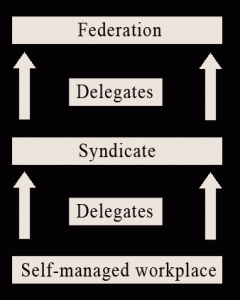
- Neoliberalism
The particular type of capitalism that defines American economic policy in our current day
(From David Harvey’s A Brief History of Neoliberalism) Neoliberalism is in the first instance a theory of political economic practices that proposes that human well-being can best be advanced by liberating individual entrepreneurial freedoms and skills within an institutional framework characterized by strong private property rights, free markets, and free trade. The role of the state is to create and preserve an institutional framework appropriate to such practices. The state has to guarantee, for example, the quality and integrity of money. It must also set up those military, defense, police, and legal structures and functions required to secure private property rights and to guarantee, by force if need be, the proper functioning of markets. Furthermore, if markets do not exist (in areas such as land, water, education, health care, social security, or environmental pollution) then they must be created, by state action if necessary. But beyond these tasks the state should not venture. State interventions in markets (once created) must be kept to a bare minimum because, according to the theory, the state cannot possibly possess enough information to second-guess market signals (prices) and because powerful interest groups will inevitably distort and bias state interventions (particularly in democracies) for their own benefit… Neoliberalism has, in short, become hegemonic as a mode of discourse. It has pervasive effects on ways of thought to the point where it has become incorporated into the common-sense way many of us interpret, live in, and understand the world. - Keynesian Economics
The economic philosophy that defined American governance from the period of the New Deal unto the Nixon administration. It is defined by deficit spending and job creation in the public sector to generate public works and infrastructure projects. As the public workers begin to take home a livable income, they in turn spend a portion of their incomes on luxury items that in turn helps an economy get out of a recession. The period of stagflation that occurred in the 1970’s and was seen as the proof that Keynesian economics does not work was caused by the end of the Vietnam war and detente policies under Richard Nixon; for the forty years since the New Deal, the main engine of Keynesian economic growth had been American patronage of the military-industrial complex and purchase of military equipment. A Green New Deal, based around Keynesian economics where the engine is renewable energy infrastructure modifications, might be able to avoid such a pitfall.
 I want to talk to you about a socialist from Vermont. Born in New York, he was active in the anti-Vietnam and civil rights movements in the 1960’s before moving to the town of Burlington, where he spent the next several decades creating a new set of socio-political ideas that combined the basic outlines of old European socialist ideology with the harsh realities of modern industrial capitalism, as well as a powerful critique of the ecological havoc wrought by the global hegemony of greenhouse gas pollution.
I want to talk to you about a socialist from Vermont. Born in New York, he was active in the anti-Vietnam and civil rights movements in the 1960’s before moving to the town of Burlington, where he spent the next several decades creating a new set of socio-political ideas that combined the basic outlines of old European socialist ideology with the harsh realities of modern industrial capitalism, as well as a powerful critique of the ecological havoc wrought by the global hegemony of greenhouse gas pollution.
But wait! If you thought this was the beginning of a stump speech for Senator Bernie Sanders, you are dead wrong. In fact I am referring to the late Murray Bookchin, a man who, in many ways, was the striking opposite of what Bernie Sanders is in every way. Bookchin was a scholar, activist, and writer whose polemics against capitalism but also cultish politicking on the far left and opportunism by people like Bernie Sanders make for great reading nine years after the man died in 2006.
I have previously written that I have a sense of respect for those who support Sanders in his quest for the Democratic Party nomination. Or rather, I did. What has made me change my mind is the reaction of Sanders supporters to the direct action techniques of #BlackLivesMatter protestors in recent weeks, which seemed to gravitate between condescending and racist to religiously fanatical and racist. “Don’t these people realize Bernie is the best thing going for them in this campaign?” “Don’t they know that Bernie marched with Martin Luther King Jr.?” In my own praxis (a socialist term referring to the combination of philosophy with action), I have a very simple rule: if someone is not going to do any real harm, I let them stick to their beliefs. It is not my place as a reporter to break the news story about how there is no Santa Claus because that would only hurt those who believe in Santa, individuals who have no capacity to cause serious damage to others.
But with the level of condescending, self-important, prejudiced nonsense coming from Sanders supporters, I do see a real threat. I can imagine in very concrete terms a moment in the near future where, should Sanders not topple the Clinton machine, his disillusioned supporters will point out the #BlackLivesMatter zap as the moment that did him in and the anti-black animus will soon follow. And in a technical sense, they would have some concrete grounds to stand on. Nate Silver’s FiveThirtyEight.com recently carried a story by Harry Enten titled THE BERNIE SANDERS SURGE APPEARS TO BE OVER, where Enten shows with mathematical precision that Bernie has reached his crescendo:
Not long ago, Democratic presidential candidate Bernie Sanders was surging. In just a few months, the Vermont senator halved Hillary Clinton’s lead in Iowa and moved to within shouting distance of her in New Hampshire. But it’s probably time to change the verb tense. No longer is Sanders surging. He has surged. From now on, picking up additional support will be more of a slog… Support for Sanders rocketed up in Iowa but has leveled off since June. The story is nearly the same in New Hampshire. Sanders rose from June to July in the Granite State, but his ascent slowed.
Eneten points out several possible reasons that could have contributed to this. Part of it has to do with the fact Bernie was the newcomer when he announced his candidacy at the end of May as compared to Hillary Clinton, who seems to have been running for office since the day after the 2012 inauguration. At the beginning of the summer, the Run Warren Run PAC was dissolved when the Senator from Massachusetts announced she would not make a Presidential bid. As a result, the Warren supporters combined forces with the Sanders supporters, based in part on politics and in part because of their mutual dislike of the Clintons. Of course, this is nothing new, it happens every election cycle, the Democrats roll out a seemingly radical candidate who has a great opening sprint but cannot maintain pace throughout the race. Do the names Howard Dean or Dennis Kucinich sound familiar? But for those who are Feeling the Bern of Sanders fever, the coincidental occurrence of the #BlackLivesMatter protest with his sluggish poll performance just breeds conspiratorial fever dreams that it was those pesky blacks who killed Bernie’s chance.
But besides that, there is also the fact that Sanders, for all his bluster, has never been serious about this. Just look at the Issues page on BernieSanders.com:
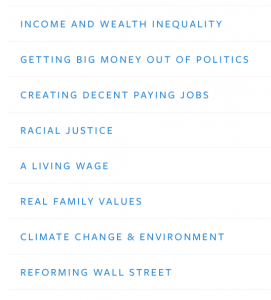
Those are all great phrases and I do not doubt that there are serious people in the general population who are earnest about those topics. But there is one phrase that every serious presidential candidate always puts on their website, without fail: FOREIGN POLICY. For all that can be said about candidate Obama, one thing that can be said without a doubt is that he had foreign policy in his campaign literature from day one. Just look at his page from September 12, 2007, as archived by the Wayback Machine on the Internet Archive:


Now look at Hillary Clinton’s website. It’s a huge, in-depth page that has multiple paragraphs dedicated to foreign policy alone. Granted, as Secretary of State she basically committed a bunch of war crimes and let Joe Biden handle the Iraq withdrawal, but at least she is trying.

This is not even hard work! And that brings me to my second point, the real Bernie Sanders. He makes some great speeches, but behind the verbiage is a pretty repellent record.
Since we are on the topic of race and Bernie, let’s talk about his supposedly great record as a young man. Everybody right now is in love with the pictures of him organizing in the Civil Rights era, and that’s a respectable feat. But what they are not talking about is what turned him on to socialism, his time in Israel living on a kibbutz. For the goyim, the kibbutz is sold as a sort of Israeli utopian experiment, a state-sponsored socialist collective where the children are cared for in a communal fashion, everyone eats and works together for the benefit for all, and the socialist dream is realized. But what they do not tell you is the bitter and painful truth about the kibbutz as an apparatus of state violence by the Israeli government against the Palestinians. Some are built in Israel proper while others are built in the Occupied Territories, which displaces the native indigenous inhabitants of the land. And, for all the socialist fluff, Arabs are strictly forbidden from joining in the effort. In fact, Noam Chomsky and the late Tony Judt, both adamant critics of Israeli policy, cite their time as kibbutzniks as one of the reasons they rejected Zionism. By contrast, Sanders thinks of this as the ideal.
When Sanders moved to Vermont, Murray Bookchin was already at work on a serious corpus of anti-authoritarian socialist literature tinged with environmental ethos that were spot-on way before being “green” was a trendy thing. When he saw Sanders, he gave him a chance but quickly came to see him as an opportunist and showboat, writing an article called SOCIALISM IN ONE CITY? THE BERNIE SANDERS PARADOX: WHEN SOCIALISM GROWS OLD for the January 5, 1986 issue of Socialist Review magazine. It is extremely difficult to locate the original article, but someone did print a quote in a thesis for Cornell University, which I replicate here:
To spoof him for his unadorned speech and macho manner is to ignore the fact that his notions of a “class analysis” are narrowly productivist and would embarrass a Lenin, not to mention a Marx…The tragedy is that Sanders did not live out his life between 1870 and 1940, and the paradox that faces him is: why does a constellation of ideas that seemed so rebellious fifty years ago appear to be so conservative today?
For the rest of his life, Bookchin would propose what he alternatively called ‘post-scarcity anarchism’ and ‘communalism’, a system of direct democratic governance that could be implemented in real time for Burlington. In reply, Sanders dismissed him as a kook.
After serving in state politics, Sanders went national in 1992 and remained in his seat thanks to a hushed-up alliance with the Vermont Democratic Party, an arrangement where the man with funny hair spouts off populist rhetoric while voting the party line and then some, such as his opposition to gun control, his vote against the Brady Bill, and . I had no idea the mothers of Sandy Hook victims were so offensive to his working-class hero ethos. For all his yapping about the Patriot Act, he voted for the 1996 Anti-Terrorism and Effective Death Penalty Act, which expanded the racist capital punishment system and created the basic structures that the Patriot Act was hinged upon.
And just so we are clear, Bernie is certainly not making moves to stand in socialist fraternity with actual socialist countries. He voted in favor of bombing the socialist nations of Libya and Yugoslavia at the behest of NATO. And for those who forget, the NATO bombing of Yugoslavia included an instance where an American missile “accidentally” landed on the Chinese Embassy in Belgrade, which qualifies as sovereign Chinese land. He’s voted for the various restrictions against Cuba when that was the national policy. He also supported the institution of the regime in the Ukraine, which most mature analysts describe as openly neo-Nazi, and has worked hand-in-hand with John Kerry to de-legitimize the Eastern Ukrainian Donbas, which democratically voted to break away from Kiev and has operated since under a policy of Leninist War Communism.
When asked in 1988 on his cable access TV show about his thoughts regarding the non-violent civil disobedience campaign of Palestinians, the First Intifada, overseen by the Soviet-backed and socialist-leaning Palestine Liberation Organization, he was more emphatic about Arab responsibility than anything else. In the clip, he does condemn a scene of brutality that had been caught on camera, but he does it in a way where it would seem that this type of thing was an exceptional case of soldiers getting out of hand as opposed to an example of continuous and systemic brutalization. When confronted about Israel’s siege of Gaza last year, he tried to claim that Hamas was somehow aligned with ISIS (they aren’t), ergo killing children is fine.
As for this idea of ‘Scandinavian social democracy’, let’s be serious. Scandinavia has a military budget that is far smaller than ours, hence the reason that they can fund healthcare and free college studies. But even then, they are not all that great. Scandinavia, like the rest of Western Europe, is in the midst of a refugee immigration deluge caused by American adventures in the Levant and North Africa. As a result, a right wing movement that is arguably more racist than ours, if that is possible, has found a resurgence among the voters.
By aligning with the Democrats, Sanders is giving tacit approval to the very party that launched the less-remembered 1918 First Red Scare, overseen by Woodrow Wilson, as well as the 1947 Red Scare, begun by Harry Truman. This is the same Democratic Party that jailed Socialist Party Presidential candidate Eugene V. Debs (allegedly Bernie’s hero), red-baited the living daylights out of Henry Wallace’s Progressive Party campaign in 1948, revoked Paul Robeson’s passport in 1950, gave final allowance for the Bay of Pigs invasion, and brought American terror to Korea and Vietnam.
One of the polemics that ended up being one of Murray Bookchin’s best was titled LISTEN MARXIST!, written in 1969. Bookchin had been involved in the Students for a Democratic Society (SDS) and saw way before anyone else that the independent spirit of the counterculture was going to fizzle out, that the glory days of Paris 1968 were flashes in the pan and the New Left was selling its soul to a type of Marxist dogmatism that can only called one thing, a cult. Bookchin was involved in revolutionary politics because he wanted to talk about socialism as a living, breathing, modern system of emancipatory liberation politics. Instead, he saw his comrades falling into a morass of Stalinist, Trotskyist, and Maoist locker room scuffles.
That is exactly my feeling about the whole Bernie Sanders thing. I am far too jaded by the Democratic Party to fall into formation and join in the chorus line. Now, if Bernie Sanders was doing something intellectually stimulating, like issuing an anthology of his favorite socialist writings as a sort of AUDACITY OF HOPE with a little more punch, and trying to have a conversation about socialism, that would be respectable. I would be on board and a full-time volunteer for a Quixotic campaign where, knowing full well he is going to lose, Bernie encouraged letting a hundred flowers bloom and a hundred schools of thought contend so to foster a national dialogue about Marxism, the Industrial Workers of the World, Leninism, and other varieties of social democracy. But instead we get this personality cult:
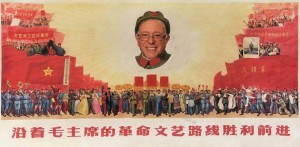
This is not a political campaign, it is a corralling action for Hillary in the form of a faux-leftist folk music concert. The Democrats needed a distraction to keep the masses in line because they know that people are not feeling inclined by destiny to vote for Hilary in the same way that I felt proud to vote for the first black president. They understand very well that people are sick to death of the Clintons. They also know they look like complete hypocrites for essentially installing a dynasty after agitating against the exact same thing with the Bush family. So who do they throw into the ring but Lincoln Chaffee to shore up the right and Bernie Sanders to pull in the left.
Personally, I have remained somewhat hopeful for Jim Webb, who very well could at some point pull a Hail Mary and steal the show in the last minute. A populist, moderate Southern governor sneaking in under the radar and stealing the race from the establishment Democrat, where have I heard of that before? Oh, right, that’s what happened in 1992 with Bill Clinton!
I do have a wisp of sympathy for those disillusioned Sanders supporters, honestly, I was a very religious Catholic and parting ways with Mother Church had its harsh moments. But here’s the rub, American electoral politics at the national level are simply far too corrupt to affect real change. We have not had a legitimate election probably since Richard Nixon put in the fix in 1968. By the time Ronald Reagan came around, everything was stage managed. Obama, for all his achievements, was less of a political scientist and more of a rock star, and that primary contest in 2008 against Hillary Clinton was closer to American Idol than American democracy.
If you want to see real change in our world, you need to do it the old-fashioned way, by working in collaboration with others to create structures that might be able to stand in for the corrupt old ways of the world, you can’t affect change from the voting booth, FaceBook, or the internet. This is about solidarity and forging cross-cultural alliances.
Perhaps one place to begin would be with the #BlackLivesMatter folks. They have just unveiled a platform with a series of tenable, real policy solutions to curb police violence. And the perfect group to promote that platform are the progressives now flocked around Bernie Sanders, they have the resources, the finances, and the sense of morality that can help BLM flourish.
Only then, united as one, could perhaps a real revolutionary movement come about to change things. But that would require something akin to rewriting the American Constitution itself.
]]> Bernie Sanders’ presidential campaign is generating interest and excitement around the Democratic primary as those on the left are now expecting a vigorous debate on the issues instead of a scripted march to the perfunctory coronation of frontrunner Hillary Clinton.
Bernie Sanders’ presidential campaign is generating interest and excitement around the Democratic primary as those on the left are now expecting a vigorous debate on the issues instead of a scripted march to the perfunctory coronation of frontrunner Hillary Clinton.
But Senator Sanders has never been a Democrat. Instead he’s an independent who caucuses with the Democrats and identifies as a democratic socialist.
There’s a lot of handwringing in the press about Sanders’ socialist labeling. Has enough time passed since the anti-communist hysteria of the 1950s for America to accept a major presidential candidate who is unabashedly socialist? Among the young, the answer seems to be yes. Among older voters, the jury is still out.
That’s one reason why I wanted to sit in with the Providence Jacobin Reading Group, held on the third Thursday of every month at the Providence Public Library downtown on Empire Street. Jacobin Magazine, for the uninitiated, describes itself as “a leading voice of the American left, offering socialist perspectives on politics, economics, and culture.”
This month’s topic of discussion is Bernie Sanders, and what his running for president means to those who share some of his socialist beliefs. The seven people attending the reading group all identify as socialists. Most are students at Brown University, and they represent a wide array of beliefs on the socialist spectrum.
Willie Thompson, who formed the group and leads the discussion, posed questions or opened avenues of discussion based on the assigned articles. The conversation comes in fits and starts. Those in attendance are deeply thoughtful, and no one dominates the conversation. Despite my intention to observe, I found myself participating more than I thought I would.

Most agreed that the chance of there being a President Sanders at the end of the election process is rather low. “Maybe all the other Democratic candidates will have heart attacks and Bernie can win,” jokes Sean. But the Sanders campaign will focus the discussion on issues important to the progressive left. It may also make the American public more receptive to socialist ideas.
“Crass opportunism to spread the word about socialism is my biggest hope,” said Thompson.
Getting the so-called middle class to wake up to the reality that the current system is serving only the wealthy is the hoped for outcome. Unlike most candidates, Sanders isn’t afraid to talk about class. “Class analysis may get people thinking about their own situation,” says Layne, “the message will reach tens of millions of people and may catalyze unions.”
 There was also some optimism expressed about Sanders’ affect on local races. Will people coming out to vote for Sanders give the edge to progressives in local races, perhaps on the level of city councils and state legislatures? If so, this would be a good time for progressives to recommit themselves to local politics, and for socialists to field their own candidates in local races.
There was also some optimism expressed about Sanders’ affect on local races. Will people coming out to vote for Sanders give the edge to progressives in local races, perhaps on the level of city councils and state legislatures? If so, this would be a good time for progressives to recommit themselves to local politics, and for socialists to field their own candidates in local races.
Most agreed that Sanders will not “pull Clinton to the left” as has been suggested in the media. “Hillary is the consummate opportunist” and a “corporatist” said someone at the table, and any move left she makes in the primary will be more than countered by her move to the center right in the general election.
Sanders maintains that he’s not running against Clinton. “He’s running an issues campaign, like Jackson, Lincoln and FDR,” said Sean. Focusing on the issues raises the tone of a campaign. The issue approach shows early signs of working. Clinton seems to want some of that progressive populism Sanders is bottling, as revealed by her recent statement to her top donors to only nominate Supreme Court justices who will overturn Citizens United, as was suggested by Sanders. It remains to be seen if Clinton will adopt more of Sanders’ ideas, such as taxing Wall Street to pay for free college.
As for Sanders ushering in some sort of Marxist utopia, don’t hold your breath. Sanders is not the spear point of the revolutionary vanguard. “Radical and revolutionary politics are not remotely possible in a Bernie campaign,”opined Ian.
Sanders is no radical, his brand of democratic socialism is in the northern European “strong social safety net” tradition, but that doesn’t mean Sanders isn’t the real deal. Eli, a Vermont native, knows Sanders to be a fierce independent and principled politician, a true rarity. Perhaps Bernie would have had a greater long term impact if he had run for governor of Vermont, as one of the assigned articles had suggested, but his entry into the race will force discussion on issues that would otherwise be ignored.
The articles read for the Sanders discussion were:
Bernie for President?: We should welcome Bernie Sanders’ presidential run, while being aware of its limits
The Problem with Bernie Sanders: Bernie Sanders’ choice to run as a Democrat means he can’t present a real alternative to Hillary Clinton
The Case for Bernie Sanders Part One
The Case for Bernie Sanders Part One
There’s a meeting of Rhode Island for Bernie Sanders at the Warwick Public Library on Sandy Lane tomorrow from 2-4pm if you want to get involved.
]]>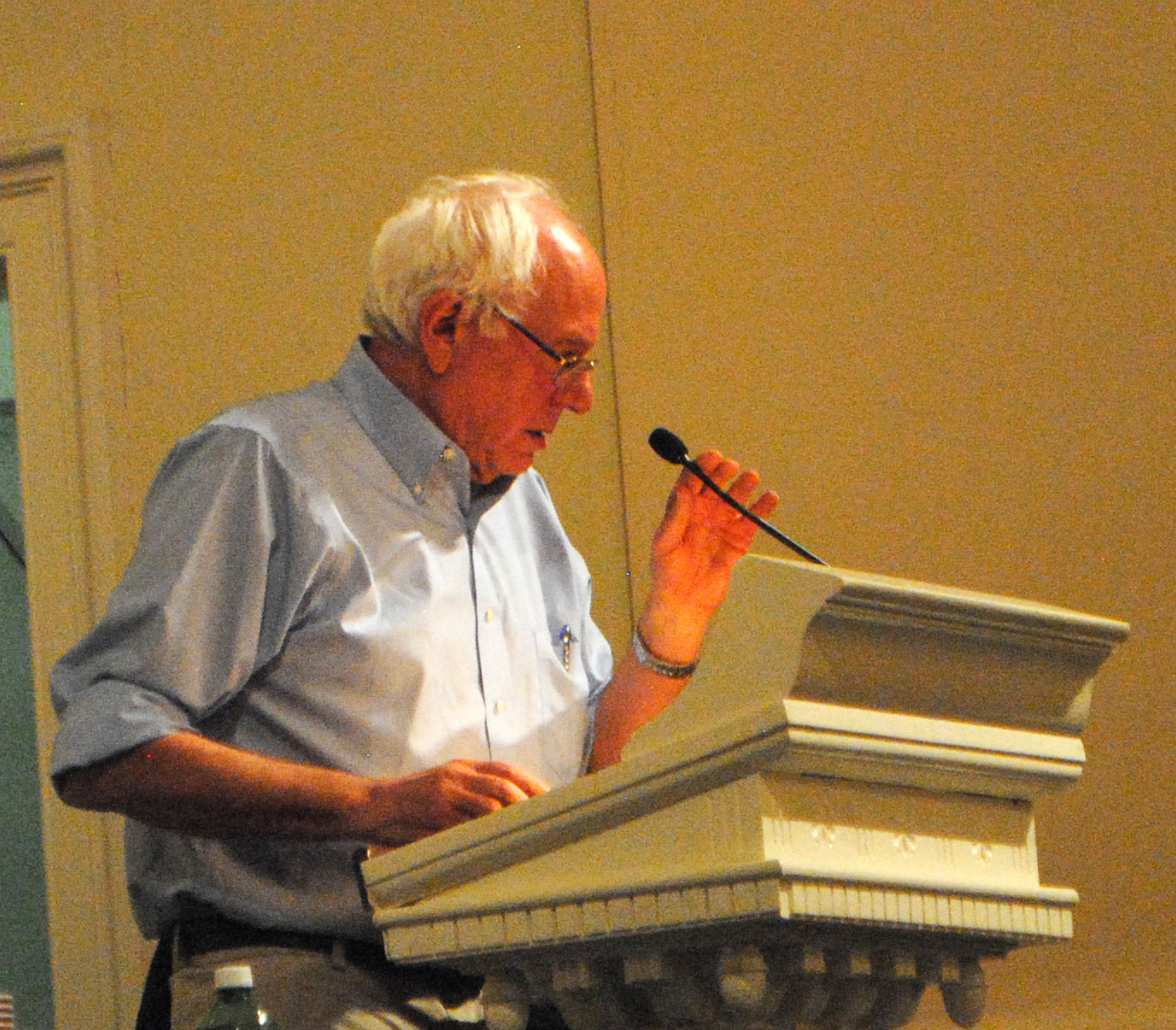
People of all ages from all over Rhode Island met Saturday at the Greenville Public Library to help elect Bernie Sanders president of the United States of America.
Sanders, a Vermont senator, declared his intent to announce his presidential candidacy on April 30th. He plans to officially enter the race on May 26, challenging former Secretary of state Hillary Clinton and former Rhode Island State Governor Lincoln Chafee for the Democratic Party nomination.
As a senator, Sanders was an independent, caucusing with the Democrats. He is expecting to run his campaign on a paltry $50 million, made up of small donations from people, as opposed to Clinton’s estimated $1 billion campaign made up of both small personal and large corporate donations.
Lauren Niedel, deputy state coordinator of the Rhode Island Progressive Democrats, ran the meeting, starting with introductions of the more than 30 people who attended, then onto the planning of phone banking, canvassing and house parties. They have a lot of ground to cover.
Clinton has near universal name recognition. Sanders does not. Spreading the word on a populist candidate fighting for the little guy takes work and dedicated volunteers.
Smartly, Sanders has hired Revolution Messaging, the firm Obama hired to do his “online fundraising, social media and digital advertising.” This is a very smart move, as a grassroots campaign needs a strong social media presence, and Sanders will be relying on younger voters.

The people attending the meeting in the library – and the campaign as a whole – are not running from the fact that Sanders is a socialist. The caveat is that he’s a democratic socialist, not a state socialist. Far from a negative, this is seen as a positive to many. One Sanders supporter, a Rhode Island business owner, said that she sees socialism as an American value. “This is a socialist country,” she said, “and the more socialist we are the better we’ll be. We have to take care of people.”
Another supporter identified as a Christian Socialist, socialism derived from the teachings of Jesus. To her, economic and social justice are religious values.
Socialism isn’t the dirty word it was during the Red Scare of the 1950’s or the Reagan era. A Huffington Post piece summarized it nicely:
A Pew Research Center survey recently found that while only 31 percent of Americans had a positive reaction to the word “socialism,” barely 50 percent of Americans had a positive view of capitalism, and 40 percent had a negative response. That’s hardly a ringing endorsement.
“The Pew poll found that young Americans are about equally divided in their attitudes toward socialism and capitalism. Among 18-to-29 year olds, 49 percent had a positive view of socialism, while 47 percent had a positive view of capitalism. Similarly, only 43 percent had a negative view of socialism, compared with 47 percent who had a negative view of capitalism.”
Socialism aside, most of the people at this meeting were just happy to have found a candidate who could speak to their issues in a serious, populist way.
“I’m eager for our issues to be a part of the conversation,” said one supporter at the meeting. “Bernie Sanders is the only one who is saying anything I want to hear,” said another.
Niedel summed up the reasons for her support when she said that Sanders “represents the people. He does not represent the 1 percent. He does not represent the corporations.” Niedel presented the group with Sanders’ 12 point economic policy plan, which seemed to resonate well with those in attendance.
Can a 73-year-old socialist senator from Vermont really take the nomination away from Clinton, who has all but been anointed as the Democrat’s 2016 contender? His supporters see a potential change in direction for American politics. If Sanders pulls it off, it will be because of the dedicated support of tens of thousands of people across the country who are much like those who gathered in the Greenville Library meeting room on Saturday.
The Rhode Island Sanders contingent will be tabling at RI Pride on June 20th, doing outreach and collecting signatures to get Sanders on the ballot. You can find out more about the Sanders campaign here.
]]>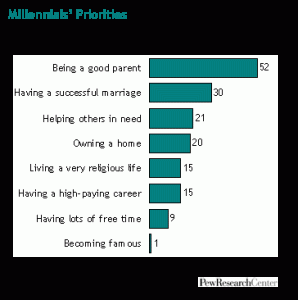 The Great Recession, spiraling debt crises, suicidal austerity, roads falling apart, the war on women, Wall Street bailouts, anti-immigrant sentiment, greater political power to religious zealots, global warming, etc., etc. I look at these and think; I can’t wait for the future.
The Great Recession, spiraling debt crises, suicidal austerity, roads falling apart, the war on women, Wall Street bailouts, anti-immigrant sentiment, greater political power to religious zealots, global warming, etc., etc. I look at these and think; I can’t wait for the future.
That’s because I’m a Millennial, and in case you don’t know, despite having the highest unemployment rate of any generation, we’re also the most optimistic. And we should be. We’re a Hero Generation.
There’s a whole generational theory that says each one views life through certain patterns. I haven’t the space to go into it now, but essentially, both the Millennial Generation and the G.I. Generation (aka. the “Greatest” Generation) have similar life events; born in a period of laissez-faire society (’20s & ’80s), come of age during a crisis where we learn teamwork (the Great Recession & Great Depression), and then go on to build great societal institutions. Between our two generations, we’re the most left-wing generations this country has ever had. The Silent Generation, the Boomers, and Generation X are all far more conservative in their outlooks and their politics.
My personal feeling is that this has to do with the Cold War. Think Glenn Beck or Allen West these days, railing against President Obama and the Democrats as believing in socialism or communism. This works for Boomers and Silent Generation types, even Generation X to some extent. Those generations all grew up in an era when the United States was in a global war against communism. Drills demanded that children hide under their desks in the event of nuclear attack (a completely useless measure). Contrast that with the Millennials, the oldest of which would’ve been eight (depending where you say the first Millennial was born) when the Berlin Wall was knocked down. The worn nuclear bomb shelter signs in my middle school were odd curiosities, as outdated as a transistor radio or pagers.
Without the threat of the Cold War, Millennials have been allowed to flourish ideologically. How different are our beliefs? If you ask Millennials about capitalism and socialism we have a slightly more favorable view of socialism. Every other generation is locked into this Cold War struggle. And for those saying Occupy Wall Street is totally socialist, guess what? Those who support Occupy Wall Street hold more favorable views of capitalism. In general terms, Millennials genuinely want government to do more. We believe it can. We have faith in it, a faith that just isn’t matched by older generations.
But that’s to sell ourselves short. It’s not even as simple as socialism vs. capitalism. That’s a Cold War mindset, something which Millennials are escaping from. What Millennials are waking up to is a whole set of ideas that veer away from that simple dichotomy. Copyright laws are running up against the impracticality of enforcement. The internet has shown us just how constructed rules are. Markets, government, etc., even these are socially constructed. Millennials are going to ask the question “why?” in ways which will be disturbing to older generations.
My generation is America’s great divergent generation. We’re the most diverse generation in U.S. history, we’re the most educated, we’re the most optimistic, we’re the most tolerant, we care more about being a good parent than having a successful marriage. But beyond that, we got into less fights with our parents, and we respect our elders more, two-thirds say that personally taking care of an elderly parent is a responsibility we have; far more than Boomer or the Silent Generation types who’ve long since shipped their parents off to assisted living facilities.
There is a generational struggle going on. On one side you have the Cold War Generations; fitfully trying to come to terms with a world in which there is no great enemy, no terrible threat of total annihilation. And on the other you have the Millennials; optimistic, happy, filled with new ideas. We will see the generations before us buried. But we’ll do our best to see that you have good lives before we do.
Consider this before you leave. Half of the recent college graduates in the Millennials are either jobless or underemployed. Interest rates on student loans is about to double (and we have on average over $24,000 in debt). So you’ve got well-educated people facing an enormous debt increase combined with a lack of resources to address that debt. Now think about the possible outcomes.
]]>

